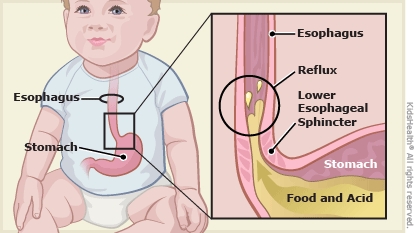Gastroesophageal Reflux Disease (GERD): How to Care for Your Baby
Gastroesophageal reflux is when food and acid from the stomach go back up into the esophagus, and sometimes out the mouth or nose. Reflux that causes problems like poor growth or damage to the esophagus is called gastroesophageal reflux disease (GERD). Follow these instructions to care for your baby.


-
Burp your baby during and after feeding:
-
When breastfeeding, burp each time you switch breasts.
-
When bottle feeding, burp after your baby drinks 2–3 ounces (60–90 ml).
-
Don't overfeed your baby. Ask your health care provider how much your baby should eat and how often.
-
Keep your baby in an upright position for 15–30 minutes after feeding time is over. Holding your baby over your shoulder is a good way to do this.
-
Put your baby in a car seat only when traveling, not at home. Being in a car seat too much can make a baby's GERD worse.
-
If the health care provider told you to thicken your baby's formula or breast milk, add between 1 teaspoon and 1 tablespoon of oatmeal cereal to each ounce (30 ml). You may need to make the hole in the bottle nipple bigger so the thickened feeds can flow.
-
Follow the health care provider's recommendations for any changes in your diet (if you are breastfeeding) or your baby's diet.
-
Always put your baby to sleep on their back at bedtime and naptimes.
-
Don't let anyone smoke near your baby. It can make your baby's reflux worse. If anyone in your house smokes, visit www.smokefree.gov for advice on quitting or call 1-800-QUIT-NOW.
-
If the health care provider prescribed medicine, follow the instructions carefully and give your child the medicine on schedule.
-
Go to all follow-up visits so your health care provider can check how your baby is doing and whether they need to be on medicine.

Your baby:
-
does not seem to be growing
-
cries a lot more than usual
-
won't eat, or cries and arches away from the bottle or breast during feedings
-
coughs, chokes, wheezes, or has trouble breathing
-
has forceful vomiting more than a few times in a 24-hour period
-
has blood in their poop
-
still has problems with reflux after 3 months on medicine

Your baby:

What causes reflux? Reflux happens because a ring of muscle at the bottom of the esophagus (the tube that runs from the mouth to the stomach) does not close all the way. This ring of muscle is called the lower esophageal sphincter (LES). If the LES does not close normally, breast milk, formula, food, and fluid from the stomach can come up the esophagus and sometimes out the mouth or nose.
How is GERD diagnosed? Health care providers diagnose GERD by asking about signs of reflux and checking a baby's growth. Usually, tests aren't needed to know if a baby has GERD.